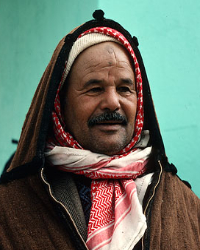Bedouin, Fezzan in Libya

Photo Source:
Anonymous
|
Send Joshua Project a map of this people group.
|
| People Name: | Bedouin, Fezzan |
| Country: | Libya |
| 10/40 Window: | Yes |
| Population: | 236,000 |
| World Population: | 236,000 |
| Primary Language: | Arabic, Libyan |
| Primary Religion: | Islam |
| Christian Adherents: | 0.00 % |
| Evangelicals: | 0.00 % |
| Scripture: | Portions |
| Ministry Resources: | Yes |
| Jesus Film: | Yes |
| Audio Recordings: | Yes |
| People Cluster: | Bedouin, Saharan |
| Affinity Bloc: | Arab World |
| Progress Level: |
|
Introduction / History
A few Fezzan Bedouins live in the coastal regions; however, most are located in the western part of Libya, known as Fezzan. This area lies just inside the northern edge of the Sahara Desert.
Bedouins fall into two basic social classes. One class is known as the "true" Bedouin, and they live as nomadic herders. The other group has embraced farming and is known as the fellahin. The fellahin lead a more settled life on the edge of the desert. "True" Bedouins move into the desert during the rainy winter seasons and back to the desert's edge during the hot, dry summers. The Fezzan Bedouin speak Fazzani as their heart language, but most speak the national language, Libyan Arabic.
What Are Their Lives Like?
The Fezzan Bedouin have a relatively harsh existence. The nomads have no permanent homes, but live in portable, black tents made from woven, goat hair. The tents are divided by a decorative partition called a gata. Half of the tent is for the women, children, cooking utensils and storage. The other half contains a fireplace and is used for entertaining. The women do most of the work, while the men socialize and make plans for the group.
The material culture of the Bedouin is limited. Their tents are their main possessions, and animals are very important for their nomadic lifestyle.
Dairy products are the main food source for the Bedouin. Milk from camels and goats is made into yogurt and butter. Most of their meals consist of a bowl of milk, yogurt or rice. They eat round loaves of unleavened bread when available. Dates from desert oases are eaten for dessert. Meat is only served on special occasions such as marriage feasts, ceremonial events, or when guests are present.
To endure the extreme heat of the desert, the Bedouin wear lightweight, light-colored clothing. It is very loose-fitting, allowing for the circulation of air.
Although Fezzan Bedouins once considered it degrading to have manual labor jobs, this has changed somewhat in recent years. Due to the need for better health conditions, more money, and better living conditions, some have accepted wage-paying jobs. However, most of them still despise this type of work.
What Are Their Beliefs?
Almost all of the Bedouin in Libya are Malikite Muslims. Islam is based on the teachings of the prophet, Mohammed. The Koran ("holy book" of Islam) was supposedly given to Mohammed by the angel Gabriel.
Islam is a religion of works that is centered on five basic "pillars." (1) A Muslim must affirm that "there is no god but Allah, and Mohammed is his prophet." (2) Five times a day he must pray while facing Mecca. (3) He must give an obligatory percentage (very similar to tithes) on an annual basis. (4) He must fast during Ramadan, the ninth month of the Muslim year. (5) He must try to make at least one pilgrimage to Mecca in his lifetime.
Islam has greatly influenced the lives of the Bedouin. For example, to preserve their people, the Bedouin are only allowed to marry those inside their own group. Also, the society is patrilineal, which means that inheritances are passed down through the males.
What Are Their Needs?
In the 2020s, Libya has been in a state of turmoil with no clear head of state or method of bringing order. Like other peoples of Libya, the Fezzan Bedouins have to protect themselves without the benefit of a stable government.
Prayer Points
Pray for the Lord to make a way for the Fezzan Bedouin people to hear and respond to Christ.
Pray for the Lord to give dreams and visions of the Lord to leaders in the Fezzan Bedouin community.
Ask the Holy Spirit to open the hearts of the Fezzan Bedouin towards the teachings of Christ and a willingness to put their faith in him alone.